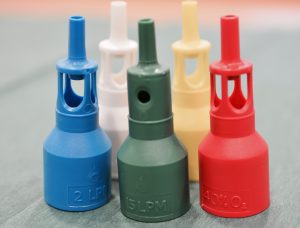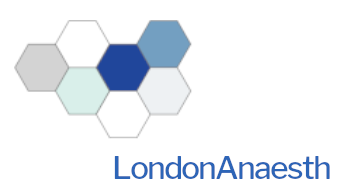
North-Central School of Anaesthesia: perioptimistic about training
As we find ourselves now more than ever delivering care to a population of patients considered to be at high-risk of major morbidity and mortality in the perioperative period, anaesthesia continues to evolve training programmes to ensure frontline workforce skills.
In our school of anaesthesia we have always identified strongly with perioperative medicine training and research and today, more than at any other time there are so many great opportunities for doctors in training to get involved. Here we highlight what’s on your doorstep. The list is unlikely to be definitive and we would be happy to hear from you, if you have had opportunities within the school that are not listed which others may benefit from.
Research
Formal higher degrees in Perioperative Medicine(POM) research & education
The Centre for Perioperative Medicine (CPOM) is an academic research and education centre, within the Division of Surgery at UCL https://www.ucl.ac.uk/surgery/research/tissue-and-energy/centre-perioperative-medicine. Here anaesthetic & critical care consultants hold academic appointments and are eager to support doctors of all grades who seek advice, guidance and opportunities in formal research and education qualifications.
Currently we have more than 10 MD/PhD anaesthetists being supervised in a wide variety of health-services research http://www.uclsource.com including bench-to-bedside translational work and a POM education faculty supervising more than 200 students on 5 continents on the UCL Masters Programme in Perioperative Medicine. If you would like more information on how you might get involved, why not contact us:-
Health Services Research: Prof Ramani Moonesinghe
Translational Research: Daniel.martin@ucl.ac.uk
Perioperative Medicine Education: Professor David Walker
Clinical/Research opportunities
Royal Free hospital (RFH): A one-year liver transplant research fellowship is offered and is an incredible opportunity to combine clinical experience in major HPB/liver transplant anaesthesia with dedicated research time focussing on aspects perioperative care.
Check out The Royal Free Perioperative Research Group (RoFPoR). https://rfanaesthesia.org/rffellowships/.
In parallel the RFH runs a 6-month POM fellowship, which can be completed in training. Contact Dr Marc Wittenberg for more details or checkout the department webpage: https://rfanaesthesia.org/rffellowships/
UCH Westmoreland Street(UCH WMS): Nine one-year POM fellowships are offered annually. They are post-FRCA positions aimed at training the next generation of perioperative medicine doctors. The posts benefit from a 50:50 clinical – professional development split and successful candidates are enrolled free onto the UCL MSc in Perioperative Medicine. The job offers an opportunity to undertake high-quality research and Quality Improvement activity and contribute clinically to POM service development. Fellows will develop advanced preassessment clinic knowledge, partake in NELA ward rounds and engage in other MDT activities within the trust. If you have a special professional interest and want to discuss it, please contact Prof David Walker.
UCH data Science Group: There are fellowship opportunities to work within the realms of Perioperative Medicine Big Data. A multidisciplinary-team lead by Anaesthetists and Intensivists at UCH currently holds a large grant to explore the utilisation of real-time data and develop real-time electronic dashboards to improve patient safety, outcomes and experiences. Want to learn more, then contact s.harris8@nhs.net
UCH: UCH offer a dedicated training module in Perioperative Medicine, where trainees can complete their intermediate and higher perioperative medicine training. This week-long programme includes a variety of clinical opportunities outside of the operating theatres: pre-assessment, perioperative medicine ward rounds, cardiology and surgical clinics and within the CPET lab. This learning is supported by an online e-learning module where trainees are introduced to the evidence base behind perioperative medicine as well as important topics such as risk assessment, shared decision making, outcome measures and perioperative care of the elderly.
We also encourage all trainees to undertake the UCL Perioperative Medicine in Action MOOC (Massive Open Online Course:) a free 4 week distance learning course introducing the key concepts behind perioperative medicine: www.futurelearn.com/courses/perioperative-medicine
If you want to find out more, please contact Dr Abigail Whiteman.
There are lots of opportunities to get involved in projects in Undergraduate teaching at the Royal Free (Dr Jane Lowery), Whittington (Dr Basil Almahdi) and UCLH (Dr Rob Stephens).We are involved in not just the teaching itself, but also we look at how our specialty can increase our visibility to students through practicals, e-learning material and simulation. In the medical school we deliver parts of the MBBS year 1, 4 and 6 curriculum and now run intercalated BSc modules (iBSc, MBBS year 3) in Anaesthesia and Acute care (lead Dr Rob Stephens) and Space Medicine and Extreme Environment Physiology (leads Drs Kevin Fong and Dan Martin).
NHNN, Queen Square: 6 neuro-anaesthesia, clinical fellowship positions are provided research time to facilitate participation in POM research/Quality Improvement, surgical pre-assessment clinics/outreach ward rounds. Offered also is 1 Fellowship position with a 50:50 clinical/research split. Clinical work is undertaken on the neuro-critical care and for further information contact Val Luoma.
Whittington Hospital: Under the leadership of Professor Hugh Montgomery the clinical team are keen to map an ideal care pathway in POM end to end and then assess with time series analysis for impact. Hugh is also interested in noise and light exposure. Evidence suggests ‘quiet’ means less analgaesic use. Does it? If these ideas interest you, contact h.montgomery@ucl.ac.uk.
There are lots of opportunities to get involved in projects in Undergraduate teaching at the Royal Free (Dr Jane Lowery), Whittington (Dr Basil Almahdi) and UCLH (Dr Rob Stephens). not just the teaching itself but to increase our visibility to students through practicals, e-learning material and simulation. In the medical school we deliver parts of the MBBS year 1, 4 and 6 curriculum and now run intercalated BSc modules (iBSc, MBBS year 3) in Anaesthesia and Acute care (lead Dr Rob Stephens) and Space Medicine and Extreme Environment Physiology (leads Drs Kevin Fong & Dan Martin).

